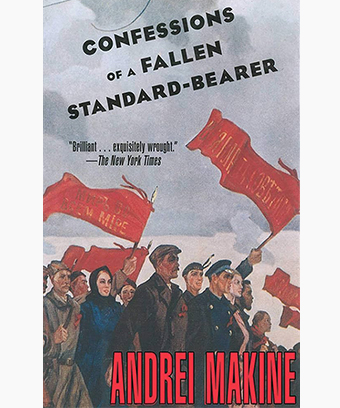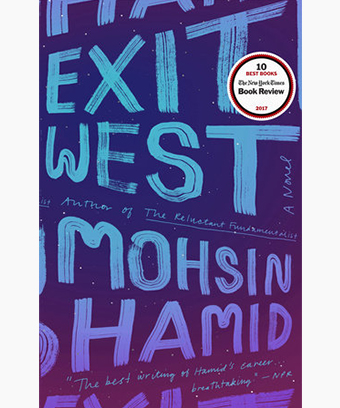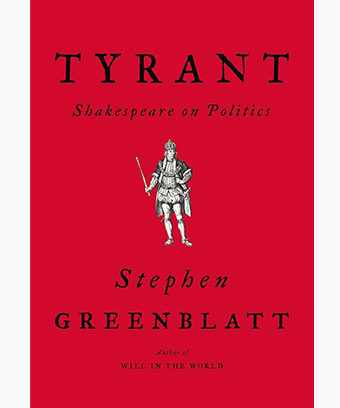Novels on Authoritarian Rule II
We understand, more than ever, what makes authoritarian regimes work. In a previous post, IGCC reviewed key academic and policy-oriented works in this vein. While political science favors impersonal, historical factors to explain the rise and workings of autocracies, it has less to say about what they look like from the inside: how elites calculate when backing or resisting autocrats and what it feels like for citizens to live under dictatorship.
In a new series reviewing fiction on authoritarian rule, we examined a range of literary forms. Some novels are historical fiction grounded in deep research. Others are imagined memoirs. Some are part of the long tradition of political dystopia.
In our latest entry, we continue the exploration of fiction, look at works ranging from Shakespeare’s interest in tyranny, an American dystopia, a postwar Russian novel, a Latin American caudillo masterpiece, to a refugee novel tracking authoritarianism amid civil war.

The Iron Heel by Jack London (1908, Penguin Books edition 2006)
London’s dystopia vividly captures the social and intellectual milieu of the United States at the turn of the 20th century. It is also prescient about one route to authoritarian rule: when political and economic elites in democracies “solve” class conflict by abandoning representative government and reverting to outright repression.
The novel rests on a curious fictional device; the story is told in the form of a lost manuscript covering events of 1912–32 and annotated in footnotes by a historian 700 years in the future. The manuscript is narrated by Avis Everhard, the daughter of professor John Cunningham. She is swept up by the charisma of her future husband Earnest Everhard, a brawny intellectual socialist and stand-in for London. The novel’s plotline has a romantic core, as Avis comes grudgingly to Earnest’s revolutionary conclusions. She does this in part through her investigation of an industrial accident that leaves a worker not only disabled but immiserated; as Avis puts it, she was “confronted by the concrete.”
A selling point for social scientists is that the novel is carried by extensive manifesto-like passages in which Everhard outlines his socialist theories and cooly eviscerates his bourgeois counterparts: in conversations, salons, speaking engagements, and in writing. As a result, the novel is a surprisingly good introduction to early 20th century leftist thought in the United States.
The logic of class conflict—the avarice of the oligarchy, the contradictions of capitalism, and the impoverishment of the proletariat—are at the heart of Earnest’s dialogues with his adversaries. London devotes an entire chapter to a mathematical theory on underconsumption that had traction at that time not only on the left but among business as well. London walks through criticisms of trusts and how they exploit both the working class and farmers, in part through the ability of railroads to set prices of both inputs and outputs. The critique touches not only the dissatisfaction of the urban proletariat but on the forces that gave rise to rural populism as well. A whole chapter is devoted to how smaller businesses are ultimately placed at risk by oligarchic domination too.
One of London’s insights is the way real power in capitalist systems—and particularly autocratic ones—rests on control just of the economy or even the state, but also a wide variety of social institutions, from publishers and the press to the legal profession. Critics have noted the novel’s focus on oligarchic manipulation of public opinion. The autocratic machine that emerges in London’s book keeps the middle class on board and stays in power by co-opting a labor aristocracy; that cooptation is one of Earnest’s most thorny problems.
When the contradictions in this system become manifest, however, the illusion of democratic institutions is revealed. London puts the proposition in the mouth of one of Everhard’s more honest interlocutors. He outlines the response of the oligarchy to possible electoral defeat at the hands of the socialists: “in roar of shell and shrapnel, and in whine of machine guns will our answer be couched … as for the host of labor, it has been in the dirt since history began … and in the dirt it shall remain so long as I and mine and those that come after us have the power. There is the word. It is the king of words—Power. Not God, not Mammon, but Power.”
In the second half of the book, Earnest’s predictions about politics play out in the world and the novel takes its dystopic turn. Economic crisis is followed by democratic backsliding: Avis’ father pushed out of his university job, censorship, the formation of a state-led militia, and the suspension of habeas corpus. The emergence of the Iron Heel—the political face of the oligarchy—is at the same time public and shadowy in its inner workings. The upshot is a suspension of democratic rule as the country descends into civil war, with its personal as well as political toll.

Confessions of a Fallen Standard-Bearer by Andreï Makine (1992, translated from the French by Geoffrey Strachan, Arcade Publishing 2000).
Andreï Makine was born in Siberia and sought political asylum in Paris only a few years before the fall of the Soviet Union. His body of work—written in French and receiving a number of literary awards—is exemplary of the fraught relations political exiles have with their homelands: agonizing over the fateful decision to leave and at the same time yearning for a nostalgic vision of the past. That said, Makine’s compact novel packs stiff political punches about the nature of communist rule.
The novel is built around two parallel family histories and covers a long arc of history from the late 1930s, through the 1950s, and even moving forward to the disastrous Soviet intervention in Afghanistan. The elder generation is represented by Yakov Zinger and Pyotr Yevdokimov, two disabled and aging veterans who form a deep fraternal bond around their horrific war experiences in World War II. The second generation is represented by their sons, Arkady and Alyosha respectively; Alyosha—a writer in exile who had served in Afghanistan as the book begins—serves as narrator.
The book toggles between memories of what Arkady and Alyosha experienced as children and what the adult narrator now knows. The title is motivated by a standard feature of communist systems: the so-called “organizational life,” through which women, workers, farmers, and youth are funneled into compulsory state organizations. Youth leagues, for example, serve multiple functions: propaganda, motivation, recruitment into the party, and, ultimately, social control and monitoring. In the novel, the league is able to parley the country’s victory in World War II into a hopeful picture—the boys fully buy into the image of youth marching, drumming, and bugling into a glorious socialist future, both at home and globally.
Yet in its denouement, the two boys are confronted with the corruption and venality of the party and stage an act of protest that foreshadows the ideological disillusionment of the post-Stalin era. Alyosha realizes that his commitments were ultimately not to the abstractions advanced by the party, but to the rich human connections forged daily in his village, such as through games of dominos that would simultaneously bring the town together and devolve into fistfights.
Later in life, Alyosha comes to understand that family histories were shaped more profoundly by issues on which their parents were silent—including the great purges of the 1930s—as they were by the war stories they recount. Makine provides a subtle portrait of how authoritarian ideologies inevitably run up against lived experience and how individuals navigate those gaps—sometimes with cognitive dissonance, and sometimes with what James Scott called everyday forms of resistance.

The Feast of the Goat by Mario Vargas Llosa (2002)
Mario Vargas Llosa (1936–2025) was no stranger to either politics nor autocracy. His first novel, The Time of the Hero (1963), took a critical look at the Peruvian military, and he served on an investigatory body on the Shining Path insurgency in the mid-1980s. In 1990 he ran for the presidency of Peru on a broadly liberal platform and was roundly defeated by Alberto Fujimori, who went on to initiate his own self-coup—or autogolpe—in 1992.
The Feast of the Goat is a thoroughly researched historical novel about the nature—and unraveling—of the Rafael Trujillo dictatorship in the Dominican Republic. The plot weaves together two distinct narratives: the psychological and political foundations of the Trujillo regime and the extraordinary power he held over the country; and the complex and diverse motives of the plotters who ultimately assassinate him in 1961.
Much of this material is grounded in historical fact. The diverse motives of the plotters provide Vargas Llosa the opportunity to explore the variety of grievances that lie just beneath the surface of autocratic rule, the most central of which he tags as the loss of free will. More central to the fictional nature of the book is the effort to understand the social psychology of autocracy: how dictators maintain power among both elites and the masses.
Layered on top of these is a third fictional plotline centered on the return of Urania Cabral to the country after a self-imposed exile of over 30 years working in international organizations. Her purpose: to come to terms with her father, a politician and Trujillo loyalist who betrayed his daughter to demonstrate his loyalty to the regime. Reflecting with his estranged daughter, Urania’s father spells out the lingering puzzles of autocracy: “how so many millions of people, crushed by propaganda and lack of information, brutalized by indoctrination and isolation, deprived of free will and even curiosity by fear and the habit of servility and obsequiousness, could worship Trujillo.”
Trujillo’s cult of personality is a recurrent theme. But Cabral goes farther: Dominicans “not merely fear [Trujillo] but love him, as children eventually love authoritarian parents, convincing themselves that the whippings and beatings are for their own good.”
Not surprisingly, Urania is more critical of the professionals who bent their wills to Trujillo’s. Her charge: “you pulled a vocation for masochism up from the bottom of your souls, that you were a people who needed to be spat on and mistreated and debased in order to be fulfilled.” Throughout the book, Trujillo’s abusive sexual life is but one way these dynamics were manifest.
Another theme that recurs across authoritarian fiction is how autocrats reach into the psyche, generating the dual life captured in a somewhat different way in Vaclav Havel’s 1978 essay, The Power of the Powerless. As Vargas Llosa puts in the mouth of one of the coup plotters, if the regime persisted “he and many other Dominicans would be condemned to this awful queasy sickness of constantly having to lie to themselves and deceive everyone else.” They had to be two people in one: a public lie and a private truth.
But of course, the dynamics of authoritarianism are not just psychological. Vargas Llosa captures well the way all paths to success—from the military to the private sector—ultimately ran through the extraordinary discretion Trujillo wielded. For social scientists, some of the best sections of the book detail the complicated political economy of corruption: the complex way Trujillo’s private assets are intertwined with the state’s and how any economic venture ultimately served at the whim of the dictator.
A final theme of interest is the Dominican Republic’s troubled relationship with the United States. One reason for Trujillo’s popularity was in his ability to rework a neocolonial relationship while maintaining elite bonds, for example, with the U.S. military through the exploitation of Cold War anxieties. By 1961, however, the Catholic Church, prominent families, and even the Kennedy administration gradually turn against his and his family’s excesses. The book shows how transitions out of such personalistic regimes are not straightforward, as family and a near-psychopathic security service vie for power with Joaquín Balaguer, a Trujillo loyalist who finally manages to break the hold of the old regime.

Exit West by Mohshin Hamid (Riverhead Books, 2017)
Civil wars are more likely to emerge in authoritarian contexts, and they invariably generate refugees. As a result, many novels of authoritarian rule grapple with exile. British Pakistani writer Mohshin Hamid’s Exit West—set in what could be Syria—follows the lives of two urban middle-class 20-somethings, Saeed and Nadia, as they forge a relationship against the backdrop of mounting domestic conflict. Internally displaced people are showing up on city streets, soldiers are manning checkpoints, curfews are enforced, and emboldened militants are launching attacks that make movement risky. The economy implodes, as firms can’t pay their workers and banks and ATMs become sites of panic and mob violence.
With rebel victory, executions start and as Hamid writes “there is always that first acquaintance or intimate of ours, who, when they are touched, makes what had seemed like a bad dream suddenly, evisceratingly real.” Inevitably, those with the means contemplate exit, grappling with the wrenching issue of family separation: “for when we migrate, we murder those from our lives those we leave behind.”
The narrative is not altogether realist, however. A defining element of the book is Hamid’s use of the door as a metaphor for migration. The doors are controlled by agents, open and close in unpredictable ways, and “passage was both like dying and like being born.” As Saeed and Nadia pass through these doors, the narrative shifts to camps in Greece and the dense immigrant underground in a dystopic London. Migrant squatters face a government, driven by nativists, that launches a massive police action against the newcomers. Ironically, government policy introduces the same uncertainties that their various homelands posed to them in the first place.
Yet Hamid finds in these migrants a resourcefulness and democratic culture that is resilient and hopeful. And he conveys these population movements not simply as a recent development, but as a defining feature of human existence, sprinkling in short vignettes from Morocco, Amsterdam, and California and noting how even families apparently rooted in one country are also constantly on the move.
The book coheres around another social fact: that whatever these global forces, migrants live their lives. The book is not just social commentary—it also manages an affecting love story between two individuals sharing their lived experience but also wired quite differently; Saeed is religious while Nadia is not. The personal and the political, the local and the global intertwine in complex ways.

Tyrant: Shakespeare on Politics by Stephen Greenblatt (W.W. Norton, 2018)
Although not a novel, this extraordinary piece of literary criticism is nonetheless a must- read for anyone interested in autocracy. Shakespeare prudently avoided overt discussions of Elizabethan politics, which raised plenty of issues particularly as the queen aged. But from his earlier plays to his last, Shakespeare used historical distance—the Romans and earlier English kings—to grapple with the nature of tyranny: in Greenblatt’s words, the question of “how it is possible for a whole country to fall into the hands of a tyrant.”
The book works its way forward in rough chronological order from the lesser-known parts of Henry VI through to the end of his career (Coriolanus and The Winter’s Tale). What makes the book so relevant is Greenblatt’s dissection—or better, reconstruction—of Shakespeare’s complicated theory of tyranny.
One starting point is “weakness at the center of the realm,” which opens the door for elite rivalry, plots, and polarization. Shakespeare notes in passing that the differences between the Dukes of York and Somerset in Henry VIII centered on an obscure legal point and were ultimately forgotten. Nonetheless, “as soon as the distinct party affiliations emerge [the White and Red Roses], everyone’s anger level suddenly seems to shoot up.” Greenblatt goes on to show how elites at loggerheads engage in “fraudulent populism”—not out of concern for the masses, but to stir up strategically useful unrest and opposition.
A theme that emerges across many of the plays is the idea that autocracy is ultimately rooted in character flaws, an idea Greenblatt plays out using Richard III: narcissism, limitless self-regard, pleasure—and skill—at domination, a sense of entitlement, and utter shamelessness. Greenblatt argues that Richard’s autocratic ambitions have their roots in his deformity and the revenge he seeks on the world for the open aversion it shows to him. That psychology may be difficult to generalize, but the idea that tyrants are morally flawed but charismatic personalities is a recurrent theme in the novels we survey, including Vargas Llosa’s.
The book works its way through the consequences of tyranny—again using Richard III—and spends chapters dissecting both Macbeth and Lear; the former considers the role of sexual anxieties in the tyrannical mind and the latter the devastating risks when the concentration of power coincides with madness.
One of Greenblatt’s most compelling chapters deals with what he calls the “enablers.” He develops a typology of these characters: those who are simply fooled by the tyrant; those who feel helpless to resist; and those who trust that the system will ultimately muddle through.
Most dangerous are the sinister groups that believe they can exploit the tyrant’s rise, including those who carry out his orders for a variety of motives. In his close reading of the plays, Greenblatt always returns to the highly contingent nature of decision-making in Shakespeare’s many autocratic moments, as this enabling class makes fateful decisions under tremendous uncertainty.
This contingent feature of authoritarian rule may not appeal to social scientists, but the closer we get to the biographical details—including in accounts of the rise of Hitler—the more apparently small decisions on the part of the enablers are found to ramify in fateful ways. Greenblatt’s is a fabulous book, clearly written for the times and speaking to them loudly.
Stephan Haggard is distinguished research professor at the UC San Diego School of Global Policy and Strategy and research director for Democracy and Global Governance at IGCC.

Global Policy At A Glance
Global Policy At A Glance is IGCC’s blog, which brings research from our network of scholars to engaged audiences outside of academia.
Read More